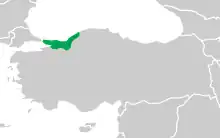| Kosswig's smooth newt | |
|---|---|
 | |
| Male during breeding season[1] | |
| Scientific classification | |
| Domain: | Eukaryota |
| Kingdom: | Animalia |
| Phylum: | Chordata |
| Class: | Amphibia |
| Order: | Urodela |
| Family: | Salamandridae |
| Genus: | Lissotriton |
| Species: | L. kosswigi |
| Binomial name | |
| Lissotriton kosswigi (Freytag, 1955)[2] | |
 | |
| range in northwestern Anatolia | |
| Synonyms[3] | |
|
Triturus vulgaris kosswigi Freytag, 1955 | |
Kosswig's smooth newt (Lissotriton kosswigi) is a newt species found in northwestern Anatolia, east of the Bosphorus.[1][4][5]: 234
Günther Erich Freytag described the species in 1955 as Triturus vulgaris kosswigii, a subspecies of the smooth newt (now Lissotriton vulgaris).[2] After genetic data had suggested the smooth newt was a complex of distinct lineages,[6] Dubois and Raffaëlli, in 2009, recognised several subspecies, including Kosswig's smooth newt, as distinct species.[7] This was followed by subsequent authors.[3][4][8] Molecular phylogenetics suggested that the closest relative of Kosswig's smooth newt is the Greek smooth newt (Lissotriton graecus) from the Balkans.[8]
The species differs from other species in the smooth newt species complex mainly in the male secondary characters during breeding season.[4] The male dorsal crest is less than 1 mm high, but high at the tail base, has smooth edges, and ends in a long filament. The well-developed dorso-lateral folds give the body a square shape. The toe flaps are well developed.[5]: 234
Paedomorphic adults have been reported for Kosswig's smooth newt.[9]
The species's conservation status has not yet been evaluated separately from the smooth newt by the IUCN. Since its range is much smaller than that of the smooth newt species complex as a whole, it is likely to be more vulnerable than previously estimated.[1][4]
References
- 1 2 3 Wielstra, B.; Bozkurt, E.; Olgun, K. (2015). "The distribution and taxonomy of Lissotriton newts in Turkey (Amphibia, Salamandridae)". ZooKeys (484): 11–23. doi:10.3897/zookeys.484.8869. ISSN 1313-2970. PMC 4361781. PMID 25829839.
- 1 2 Freytag, G.E. (1955). "Ein neuer Teichmolch aus der Türkei". Zoologischer Anzeiger (in German). 154: 195–200.
- 1 2 Frost, D.R. (2020). "Lissotriton kosswigi (Freytag, 1955)". Amphibian Species of the World: An Online Reference. Version 6.1. New York, USA: American Museum of Natural History. doi:10.5531/db.vz.0001. Archived from the original on 25 April 2020. Retrieved 25 April 2020.
- 1 2 3 4 Wielstra, B.; Canestrelli, D.; Cvijanović, M.; et al. (2018). "The distributions of the six species constituting the smooth newt species complex (Lissotriton vulgaris sensu lato and L. montandoni) – an addition to the New Atlas of Amphibians and Reptiles of Europe" (PDF). Amphibia-Reptilia. 39 (2): 252–259. doi:10.1163/15685381-17000128. S2CID 4941926. Archived from the original (PDF) on 28 April 2019.
- 1 2 Sparreboom, M. (2014). Salamanders of the Old World: The Salamanders of Europe, Asia and Northern Africa. Zeist, The Netherlands: KNNV Publishing. doi:10.1163/9789004285620. ISBN 9789004285620.
- ↑ Babik, W.; Branicki, W.; Crnobrnja-Isailovic, J.; et al. (2005). "Phylogeography of two European newt species – discordance between mtDNA and morphology". Molecular Ecology. 14 (8): 2475–2491. doi:10.1111/j.1365-294X.2005.02605.x. ISSN 0962-1083. PMID 15969729. S2CID 7484766.
- ↑ Dubois, A. & Raffaëlli, J. (2017). "A new ergotaxonomy of the family Salamandridae Goldfuss, 1820 (Amphibia, Urodela)" (PDF). Alytes. 26: 1–85. S2CID 85602660. Archived from the original (PDF) on 25 April 2020.
- 1 2 Pabijan, M.; Zieliński, P.; Dudek, K.; Stuglik, M. & Babik, W. (2017). "Isolation and gene flow in a speciation continuum in newts". Molecular Phylogenetics and Evolution. 116: 1–12. doi:10.1016/j.ympev.2017.08.003. ISSN 1055-7903. PMID 28797693.
- ↑ Bozkurt, E.; Olgun, K.; Wielstra, B. (2015). "First record of facultative paedomorphism in the Kosswig's newt Lissotriton (vulgaris) kosswigi (Freytag, 1955) (Urodela; Salamandridae), endemic to northwestern Turkey". Turkish Journal of Zoology. 39: 976–980. doi:10.3906/zoo-1408-53. ISSN 1300-0179.